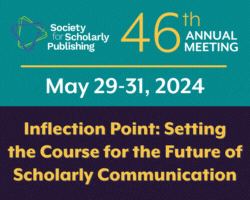 The Society for Scholarly Publishing (SSP) will host six pre-meeting seminars on June 1 in Vancouver, ahead of the 2016 Annual Meeting. The seminars will be split between a morning session, 8:30 a.m. to 11:30 a.m., and an afternoon session, 12:30 p.m. to 3:30 p.m., allowing attendees to participate in two seminars prior to the opening plenary.
The Society for Scholarly Publishing (SSP) will host six pre-meeting seminars on June 1 in Vancouver, ahead of the 2016 Annual Meeting. The seminars will be split between a morning session, 8:30 a.m. to 11:30 a.m., and an afternoon session, 12:30 p.m. to 3:30 p.m., allowing attendees to participate in two seminars prior to the opening plenary.
The pre-conference is a great way to take a deep dive into a subject in a more close-knit setting. Topics this year include predatory publishing, sustainable Open Access publishing models, data publishing, data interchange, global expansion case studies, and user experience design. Sign up for the seminar sessions is available as an add-on during registration for the Annual Meeting.
The sessions cover a wide range of topics. Morning seminars are offered covering predatory publishing, machine readable data formats, and open access, whereas the afternoon seminar sessions will examine data publishing, international publishing, and user experience design. More information about the pre-meeting seminars can be found on the SSP website.
Full descriptions of the sessions are below:
- Seminar 1: All Things Predatory – Tackling Irresponsible and Corrupt Commercial Practices in Publishing and Author Services (8:30 a.m. to 11:30 a.m.)
The new economy of publication and supportive academic services has attracted irresponsible and often predatory practices by corrupt individuals and companies; not only in the form of predatory journals, but also activities in the conference proceedings space, as well as in the author services community (language editing, translation, and publication support services). Some of the resulting schemes and scams have led to highly publicized retractions and ongoing concerns regarding what these practices may ultimately mean for the integrity of the scholarly literature. This session will explore all issues on the landscape, expose some of the known practices, and talk about some ways that, as an industry, we can come together to efficiently communicate among ourselves, inform authors, and tackle these challenges head-on. Efforts such as the Coalition for Responsible Publication Resources, Think.Check.Submit, the Alliance for Scientific Editing in China, and the China government’s “5-No” policy will be showcased.
Moderator: Donald Samulack, Editage
Speakers: Duncan MacRae, Wolters Kluwer Health Medical Research; Eduardo Franco, McGill University; Anne Powell, INASP; Gordon MacPherson, IEEE; Donald Samulack, Editage; Stephen Laverick, Edanz Group Ltd.
- Seminar 2: Machines as the New Readers: Theory and Practice of Data Interchange for Implementing Open Funder Registry and Other Identifiers in Publisher Workflows (8:30 a.m. to 11:30 a.m.)
The Internet was invented for person-to-person communication, and the World Wide Web for people to view scholarly articles. But as the Web has grown, computer-to-computer interaction across large sets of data has become a more important use of the Internet and Web. In the first half of this seminar, the RFC Editor, publisher for the Internet Engineering Task Force (IETF), will explore how this transition occurred, and how it has evolved through the application of web standards. The first half will end with an exploration of how new Web standards can be applied to solve access problems and provide a true single sign on service for scholars. In the second half, a panel will examine how Crossref’s Open Funder Registry is a specific application computer-to-computer interaction to provide standardized reporting of funding information for published scholarly research. This panel will look at the Open Funder Registry initiative from a variety of perspectives including a high-level overview of why persistent funder identifiers are important to funders, researchers, and publishers; how they interrelate with other persistent IDs (e.g., ORCID,) and include Open Funder Registry use case examples. A Crossref panelist will provide more detail about how Open Funder Registry works: where does the data come from and go to, and what are the best practices for depositing related metadata. Finally, two publishers will discuss the different work flow approaches they have taken and the challenges they’ve faced to make Funding data work, including collecting and correcting funding information from authors, working with vendors, implementing mandates, lessons learned, and next steps to refine the process.
Moderators: Elizabeth Demers, John Hopkins, University Press; Bruce Rosenblum, Inera
Speakers: Heather Flanagan, Spherical Cow Consulting; Robert O’Donnell, Rockefeller University Press; Alice Meadows, ORCiD; Charles Koscher, Crossref; Richard Padley, Semantico; Jennifer Mayfield, The Optical Society
- Seminar 3: Open Access and Sustainability – Just How Solid is the Current Landscape? (8:30 a.m. to 11:30 a.m.)
Open access has been with us for at least fifteen years and yet still seems to be in a state of flux. Different regions of the world seem to be coalescing around different kinds of OA: gold in Europe and green elsewhere. Of late there has been talk of platinum or diamond OA. But what is the long-term sustainability of these models? Is the hybrid journal model going to stick or are we at a transition point to where most journals will flip to an entirely OA model? And what about copyright and the resistance of non-STEM fields to taking up OA? And of course books, what models have emerged in the realm of OA books and are they sustainable? This seminar will tackle these issues with an eye towards seeing how sustainable these models are and if they are transitory where they might lead us in the immediate future.
Speakers: Louise Page, PLOS; Robert Kaufman, Copyright Clearance Center, Inc.; Robert Harington, American Mathematical Society; Stephen Pinfield, The University of Sheffield, Information School
- Seminar 4: Confronting Data Publishing Boundaries/Navigating the Pitfalls of Data Publishing (12:30 a.m. to 3:30 p.m.)
As authors face increased pressures to share their data, publishers are confronted with myriad practical challenges to accommodate the demand. What responsibility does the publisher have for publishing data? Who owns the shared data? What data is inappropriate to share? How do the authors of data sets receive proper credit? What, if anything, should be done to ensure the machine readability of a data set? In this seminar, we’ll talk through these issues as faced by publishers and contributors who are confronting and pushing data publishing boundaries.
Moderator: Kerry Kroffe, PLOS ONE
Speakers: Sunje Dallmeier-Tiessen, CERN; Laura Rueda, DataCite; Daniella Lowenberg, PLOS
- Seminar 5: Playing Global Moneyball and Impactball Well: Tools and Case Studies for Publishing Intelligently in International Markets
What’s your Global IQ? To succeed in our swiftly changing and ever flattening world, organizations must look at their practices and offerings in new ways and often through new eyes. Not so long ago, we might have been able to do this once in a while and walk away or simply rinse and repeat in a variety of settings. Now we must remain committed to responding to changing needs around the world. This calls for access to the best information, tempered by practical, implemental insights born of years of on-the-ground interpersonal experience. Global IQ = f (cultural intelligence*business intelligence). Where can we come by these insights and which are the right strategies for our organizations unique priorities? This session will focus on a variety of ways for improving service and impact, mission and revenue in international milieus. Seasoned staff will review new technologies and present case studies of successfully reaching new audiences in global markets.
Moderator: Adrian Stanley, Digital Science
Speakers: John Shaw, SAGE Publications, Inc.; Pinar Erzin, Accucoms; Michael Duckworth, University of Hawai’i Press; Jeff Mahony, American Academy of Pediatrics; Maria Stanton, American Theological Library Association; John Hammersley, Overleaf; Sharon Yi, Research Square
- Seminar 6: The Elements of the User Experience Design
User experience is still a developing field, and opportunities for improvement continue to emerge. We will present an overview of the key elements of the user experience, along with some guidelines to get started in each of them. The context will be about the environment and circumstances of usage anything that affects the interaction between the user and the interface because the context can change constantly and rapidly. While we often focus on distractions, multitasking, motion, low lighting conditions and poor connectivity, it also includes the other extreme think using a tablet in a relaxed setting over a fast wifi connection. This seminar aims to familiarize you with the professional discipline of UX design in the context of Web-based and mobile-based systems.
Moderator: Gurvinder Batra, Kiwitech
Speakers: Brian McDonald, Silverchair Information Systems, Bonnie Gruber, Delta Think; Pamela Rigden-Snead, American Chemical Society; Collin Brady, Silverchair



Join the Conversation
You must be logged in to post a comment.